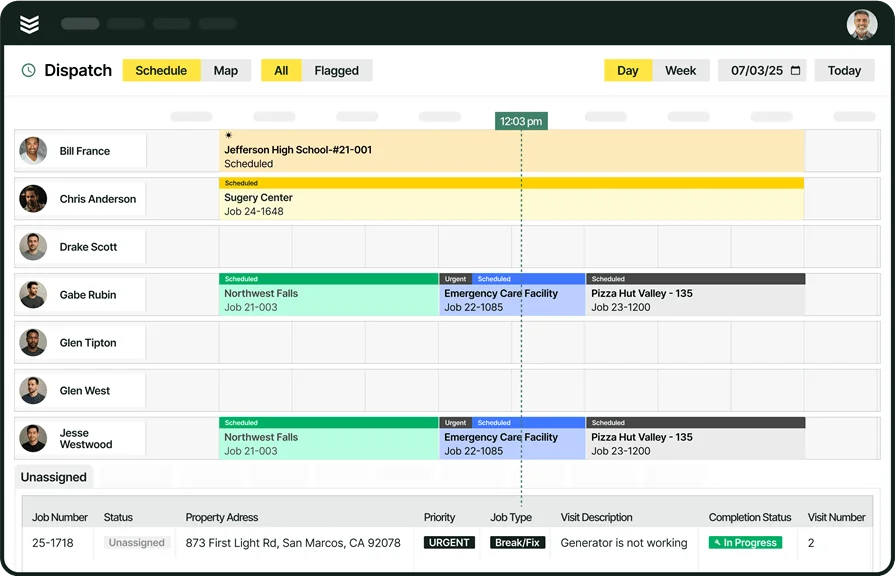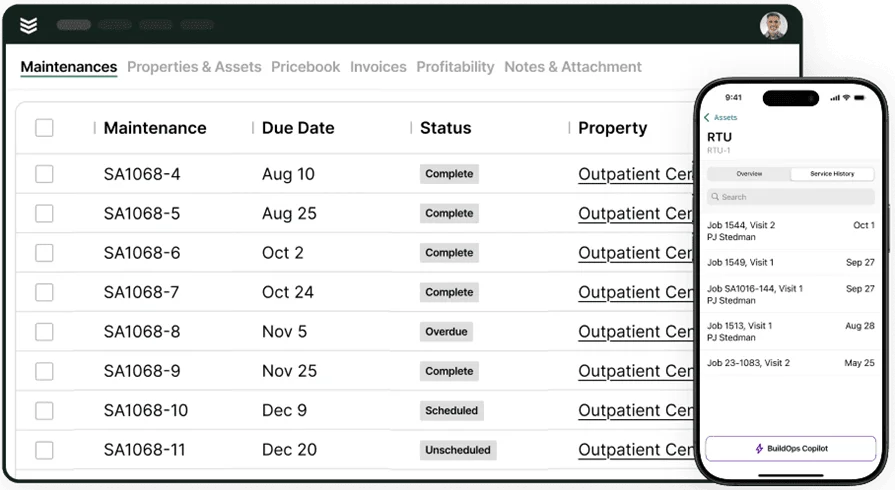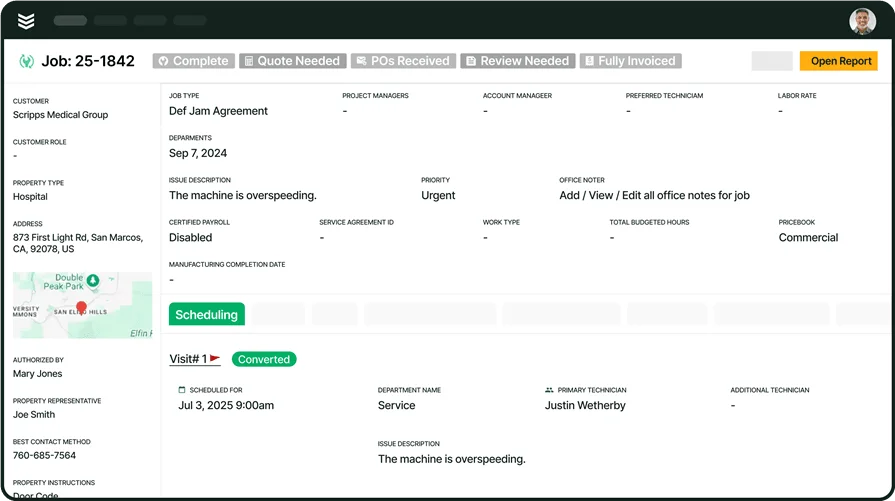Keeping an HVAC business running smoothly means staying on top of scheduling, managing teams, handling inventory, and keeping customers happy. Without the right systems, delays pile up, communication breaks down, and productivity takes a hit. That’s why HVAC field service management is critical. It helps streamline daily operations, improve efficiency, and keep jobs moving without the headache. If you're in the HVAC industry—whether as a contractor, technician, or business owner—you need a system that works.
In this guide, we’ll break down the essentials of HVAC field service management, including:
- What is HVAC field service management?
- 10 HVAC field service management best practices that will help you scale faster
- 7 benefits of using HVAC software for field service management
- 7 top HVAC field service management tools
Before diving into strategies and software recommendations, it’s important to define what field service management means for HVAC. Unlike other trades, HVAC businesses juggle emergency calls, seasonal demand, complex installations, and ongoing maintenance contracts—all while keeping technicians in the field and schedules on track.
Every part of the process, from dispatching the right tech to tracking job progress, directly impacts efficiency and profitability. Let’s start with the foundation—what HVAC field service management is and why it matters.
What is HVAC field service management?
HVAC field service management is the process of scheduling, dispatching, tracking, and optimizing field operations. It ensures HVAC technicians arrive on time, jobs are completed efficiently, and communication between teams and customers runs smoothly, improving service quality and profitability.
HVAC businesses handle emergency repairs, installations, and maintenance—often under tight deadlines. A well-structured field service management system helps streamline operations, reduce downtime, and improve customer satisfaction. The right tools and strategies keep teams efficient and businesses profitable.
Who makes up an HVAC field service management team?
An HVAC field service management team is made up of key roles that keep operations running smoothly. From scheduling and dispatching to hands-on service and customer interactions, each person plays a crucial part in ensuring jobs are completed efficiently. Here’s a breakdown of the core team members:
- Field service manager – Oversees daily operations, ensuring technicians are dispatched efficiently, schedules are optimized, and jobs are completed on time. They also track performance, handle customer escalations, and implement strategies to improve service delivery.
- Contractors – Independent professionals or subcontractors who handle specialized installations, repairs, or maintenance. They provide additional labor support during peak seasons or for large-scale projects that require extra expertise.
- Field service technicians – The backbone of any HVAC operation, technicians are responsible for diagnosing issues, performing repairs, and ensuring installations meet safety and performance standards. They work directly with customers and need strong technical skills to handle a wide range of service calls.
- HVAC dispatcher – Coordinates scheduling and assigns jobs based on technician availability, skillset, and location. Dispatchers communicate between the field and office, ensuring service calls are handled efficiently and urgent requests are prioritized.
- Inventory specialist – Manages HVAC parts, tools, and equipment to ensure technicians have what they need for each job. They track stock levels, place orders, and prevent delays caused by missing or unavailable parts.
What goes into the HVAC field service management process?
A field service management process specific to HVAC involves multiple moving parts that must work together seamlessly. From handling emergency calls to managing technician availability, every step plays a role in keeping operations efficient and profitable. Here are the key factors that shape this process:
- Job prioritization – Not all service calls are equal. Emergency breakdowns, seasonal maintenance, and new installations must be scheduled based on urgency, technician expertise, and customer needs to avoid delays and maximize efficiency.
- Technician availability – Workforce capacity directly affects how quickly jobs get scheduled. Properly managing shift schedules, overtime, and workload distribution ensures teams can handle incoming jobs without burnout or service gaps.
- Route planning and optimization – Assigning technicians to jobs based on location helps cut travel time, fuel costs, and delays. Smart route planning ensures techs get to job sites faster and complete more calls in a day.
- Equipment and materials preparation – Before heading to a job, technicians need the right tools, replacement parts, and safety gear. Proper prep prevents unnecessary delays and ensures jobs are completed in one visit whenever possible.
- Customer follow-ups and service verification – After a job is completed, confirming service quality, handling any additional requests, and gathering customer feedback help maintain high standards and improve future operations.
Every aspect of HVAC field service management plays a role in keeping jobs running smoothly and customers satisfied. But to truly optimize operations and scale efficiently, it takes more than just managing daily tasks—it requires following proven best practices. Let’s dive into the top strategies that will help HVAC businesses grow.
10 HVAC field service management best practices that will help you scale faster
Managing field service in the HVAC industry comes with unique challenges—emergency calls, seasonal fluctuations, specialized equipment, and complex installations. Unlike other industries, HVAC service management requires balancing urgent repairs with scheduled maintenance, optimizing technician availability, and ensuring every job runs smoothly. The best practices below are designed specifically for HVAC businesses to improve efficiency, reduce downtime, and increase profitability.
1. Prioritize emergency calls without disrupting scheduled jobs
HVAC service often involves urgent repairs, especially in extreme weather conditions. A structured triage system helps prioritize emergency calls without causing major delays to routine service appointments. Using software that dynamically reschedules jobs ensures high-priority calls get addressed while minimizing disruptions.
2. Use smart scheduling to optimize technician availability
Unlike other industries, HVAC jobs vary in complexity, requiring different skill sets. Assigning the right technician to each job based on expertise, availability, and location ensures faster service completion. Smart scheduling tools help prevent technician burnout and ensure balanced workloads.
Deep Dive
Learn how to streamline your scheduling process with our comprehensive guide to HVAC scheduling and dispatching.
3. Automate parts and inventory tracking
Nothing slows down an HVAC job like missing parts. Implementing automated inventory tracking ensures technicians have the necessary components before heading to a job site. This minimizes delays, prevents unnecessary rescheduling, and keeps operations running efficiently.
4. Implement real-time technician tracking
HVAC businesses rely on field technicians traveling between multiple job sites daily. GPS tracking and live job updates provide dispatchers with real-time visibility, allowing them to adjust schedules, reroute technicians, and keep customers informed about arrival times. See how time tracking for field service technicians helps prevent scheduling gaps and improves the overall efficiency of your HVAC business.
5. Standardize service checklists to ensure consistency
Every HVAC job—whether installation, maintenance, or repair—should follow a structured workflow. Standardized checklists ensure all necessary steps are completed, reducing errors, improving service quality, and helping technicians work more efficiently. Learn how HVAC safety checklists standardize technician workflows and improve safety.
6. Improve technician and customer communication
Clear communication between technicians, dispatchers, and customers prevents miscommunication and delays. Using automated messaging, live updates, and two-way communication tools ensures technicians arrive prepared and customers stay informed throughout the service process.
7. Reduce travel time with route optimization
HVAC jobs require technicians to cover large service areas, making travel time a critical factor. Route optimization software helps reduce drive time between jobs, lower fuel costs, and increase the number of service calls completed in a day. Explore different strategies for field service optimization to maximize the effectiveness of your HVAC operations.
8. Use predictive maintenance to increase service efficiency
Instead of waiting for equipment to break down, predictive maintenance uses data to identify issues before they lead to system failures. HVAC businesses can leverage smart monitoring tools to schedule maintenance proactively, reducing emergency calls and increasing customer satisfaction. Discover how HVAC maintenance software can help you move from reactive to proactive service.
9. Train technicians to upsell preventive services
A well-trained technician isn’t just a problem solver—they’re also a trusted advisor. Encouraging techs to educate customers on preventive maintenance, energy efficiency upgrades, and system longevity improvements helps generate additional revenue while providing long-term value to customers.
10. Invest in HVAC-specific field service management software
Generic field service tools don’t always fit the needs of HVAC businesses. Investing in FSM software designed specifically for HVAC operations ensures seamless scheduling, dispatching, invoicing, and performance tracking—all in one integrated platform.

Get the HVAC Growth Report
See how leading HVAC teams grow their business and boost revenue.
7 benefits of using HVAC software for field service management
Managing an HVAC business without the right software is like trying to run a job site without tools—inefficient and frustrating. HVAC field service management software helps streamline operations, reduce downtime, and improve customer service. It automates scheduling, dispatching, and invoicing while ensuring technicians have everything they need to complete jobs efficiently.
7 benefits of using HVAC field service management software
HVAC businesses face unique challenges, from emergency calls to complex installations. The right software eliminates bottlenecks and improves efficiency across the board. Here’s how:
- Faster response times for emergency calls – Automated scheduling ensures urgent jobs are prioritized, reducing delays for customers dealing with system breakdowns.
- More jobs completed per day – Smart technician assignment and route optimization cut down on wasted time, allowing businesses to handle a higher volume of service calls.
- Reduced administrative workload – Automated invoicing, job tracking, and reporting free up office staff, allowing them to focus on business growth instead of paperwork.
- Minimized costly callbacks – Access to service history and checklists ensures technicians have the right information, leading to fewer mistakes and return visits.
- Better cash flow and faster payments – Digital invoicing and integrated payment options reduce billing delays and speed up revenue collection.
- Lower operational costs – Efficient scheduling, route optimization, and inventory tracking prevent unnecessary fuel use, overtime pay, and excess part orders.
- Higher customer satisfaction and retention – Automated appointment reminders, real-time ETAs, and professional digital service reports improve customer experience, leading to repeat business and referrals.
The benefits of HVAC field service software go beyond streamlining daily operations—it also ensures businesses stay competitive in a fast-moving industry. But not all solutions are built the same. Next, we’ll cover the key features to look for when choosing an HVAC field service management system.

Check out our service management suite
We help HVAC contractors manage service orders so they can keep cash flow moving.
6 features to look for in an HVAC field service management solution
Not all FSM software is built with HVAC businesses in mind. Unlike other trades, HVAC companies manage emergency calls, seasonal demand, complex installations, and long-term service agreements. The right software must support these unique challenges with tools designed to keep jobs running smoothly. Here are the must-have features:
- Smart scheduling and dispatching – A well-run HVAC business depends on getting the right technician to the right job at the right time. Whether handling emergency repairs or scheduled maintenance, HVAC field service scheduling software ensures optimal technician assignments based on skill set, location, and job urgency. When a rooftop unit goes down at a commercial facility in peak summer, dispatchers need to instantly locate and send the closest, most qualified tech—without disrupting the rest of the day's jobs.
- Integrated invoicing and payments – Billing delays hurt cash flow, especially for HVAC businesses juggling multiple jobs daily. With HVAC field service invoicing tools, technicians can generate and send invoices immediately after completing a job, and customers can pay on the spot through integrated payment options. A technician who just finished an AC replacement can provide the customer with an invoice via mobile app, making it easy for the customer to review and pay before the tech even leaves the site.
- Mobile technician tools – Field techs don’t have time to dig through paperwork or call the office for job details. With a field service technician mobile app for HVAC contractors, they can access work orders, customer history, and equipment details right from their phone or tablet. If a tech arrives at a site and sees an unfamiliar HVAC unit, pulling up past service records on their app saves time and prevents unnecessary troubleshooting.
- Fleet and asset tracking – Service delays often start before a tech even arrives at the job site. Fleet management software for HVAC businesses provides real-time vehicle locations, ensuring dispatchers can monitor routes, reduce fuel waste, and reassign jobs as needed. When a tech gets stuck in traffic while en route to an urgent repair, dispatchers can reroute another nearby tech to prevent customer downtime.
- CRM built for HVAC contractors – Strong customer relationships drive repeat business and long-term service contracts. A CRM system stores customer history, automates follow-ups, and tracks past work. After servicing a restaurant's refrigeration system, an automated reminder can prompt a follow-up in six months to schedule routine maintenance—before another costly breakdown occurs.
- Service agreements and contract management – Recurring revenue is essential for HVAC companies that rely on maintenance contracts. FSM software with service agreement tracking automates contract renewals, invoicing, and upcoming service reminders. A building owner with a 5-year HVAC maintenance contract won’t need to call in for scheduling—the system automatically generates a work order and assigns a technician based on the agreement terms.
Selecting HVAC field service management software isn’t just about digitizing processes—it’s about ensuring technicians, office staff, and customers stay connected in real-time. With the right tools, businesses can handle more jobs, reduce delays, and maintain strong customer relationships. Next, we’ll break down the top FSM tools designed specifically for HVAC companies.
7 top HVAC field service management tools
Choosing the right field service management software depends on the type of HVAC work you do. Residential, commercial, and specialized contractors all have different needs, from dispatching efficiency to contract management. Below are the top FSM tools based on HVAC specialty.
1. Best for commercial HVAC field service management: BuildOps
BuildOps is designed specifically for commercial HVAC businesses, offering robust scheduling, dispatching, service agreements, and quoting tools. It streamlines operations for teams handling large-scale projects, preventative maintenance contracts, and high-volume service calls. Its cloud-based platform integrates field operations with office workflows, ensuring real-time communication and efficiency.
Why This is Best for Commercial HVAC: BuildOps supports multi-site service operations, detailed asset tracking, and contract-based service agreements—essential for commercial HVAC companies managing long-term clients and complex projects.

See BuildOps in action
Keep your HVAC technicians connected to job details they need in the field.
2. Best for residential HVAC companies: Housecall Pro
Image Source: Housecall Pro
Housecall Pro is a simple, user-friendly platform catering to small residential HVAC companies. It offers scheduling, dispatching, and invoicing, along with built-in customer notifications and online booking. While great for smaller operations, it may lack the depth of features needed for large-scale service contracts and commercial projects.
Why This is Best for Residential HVAC: Housecall Pro’s customer portal allows homeowners to schedule services online, view service history, and make payments, making it ideal for residential HVAC businesses focused on customer convenience.
3. Best for general contractors: Jobber
Image Source: Jobber
Jobber is a versatile FSM tool that works well for general contractors, including those handling HVAC alongside other trades. It includes scheduling, invoicing, and job tracking features, though it may not offer HVAC-specific tools like asset tracking or contract management.
Why This is Best for General Contractors: Jobber’s ability to manage multiple service types, create custom job workflows, and handle client communications makes it a strong choice for HVAC contractors who also offer plumbing, electrical, or general handyman services.
4. Best for on-site HVAC technicians: FieldEdge
Image Source: FieldEdge
FieldEdge is built for HVAC companies that prioritize field mobility. Its technician app provides real-time access to job details, customer history, and invoicing, reducing back-and-forth communication with the office. While effective for on-site technicians, its CRM and reporting features may not be as advanced as other platforms.
Why This is Best for On-Site HVAC Technicians: FieldEdge allows technicians to generate invoices, collect payments, and access equipment history from their mobile devices, helping them complete jobs faster without delays.
5. Best for small HVAC businesses: Sera
Image Source: Sera
Sera is built for small HVAC businesses looking to streamline operations without the complexity of enterprise-level software. It offers automated scheduling, dispatching, and customer communications, making it easier for small teams to manage daily service calls. However, it may not be the best fit for larger HVAC operations requiring extensive contract management or multi-location service tracking.
Why This is Best for Small HVAC Businesses: Sera’s automation tools help small HVAC companies optimize scheduling and reduce administrative work, allowing owners to focus more on growth and customer service.
6. Best for multi-service contractors: Workiz
Image Source: Workiz
Workiz is designed for HVAC contractors who also offer other services like plumbing, electrical, and appliance repair. It provides scheduling, invoicing, and communication tools in an easy-to-use interface. While great for multi-service operations, HVAC businesses needing highly specialized industry tools—such as asset tracking for commercial equipment—may find its features limited.
Why This is Best for Multi-Service Contractors: Workiz works well for HVAC professionals who juggle multiple trades, offering a centralized platform to manage dispatching and job tracking across different services.
7. Best for mechanical and small commercial HVAC: ServiceTrade
Image Source: ServiceTrade
ServiceTrade is a solid option for mechanical and commercial HVAC businesses focused on service agreements and preventative maintenance. It excels in tracking recurring jobs and automating customer communications but may not be the best fit for companies that primarily handle residential HVAC repairs.
Why This is Best for Mechanical and Commercial HVAC: ServiceTrade helps commercial HVAC teams manage long-term service contracts, ensuring clients receive timely inspections and maintenance while keeping operations organized.
Running a successful HVAC business isn’t just about fixing equipment—it’s about keeping operations smooth, technicians efficient, and customers satisfied. Managing service calls, scheduling jobs, tracking inventory, and ensuring seamless communication between the field and office can quickly become overwhelming without the right systems in place. That’s why having a strong field service management strategy is critical. The right tools and processes don’t just help you stay organized—they allow your business to grow, improve response times, and maximize revenue.
Many FSM solutions claim to work for all industries, but HVAC comes with its own unique challenges. An all-in-one platform built specifically for HVAC contractors ensures that every aspect of service management—dispatching, scheduling, invoicing, and maintenance contracts—works seamlessly together. From handling urgent repairs to managing long-term service agreements, the right software keeps your entire team connected and working efficiently.

Take a closer look at BuildOps
See how we help HVAC businesses run a tighter, more profitable operation.







